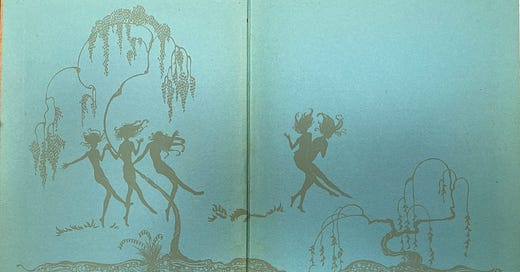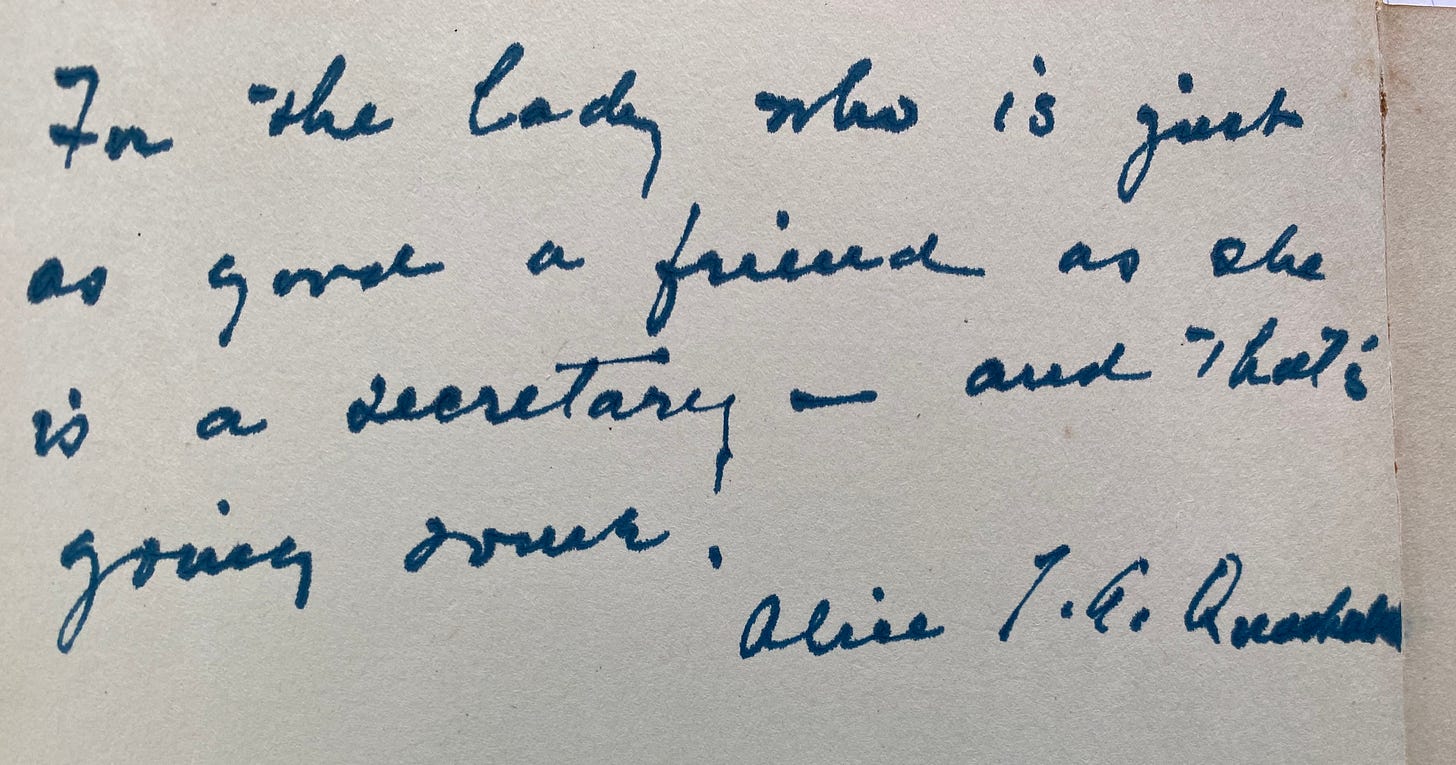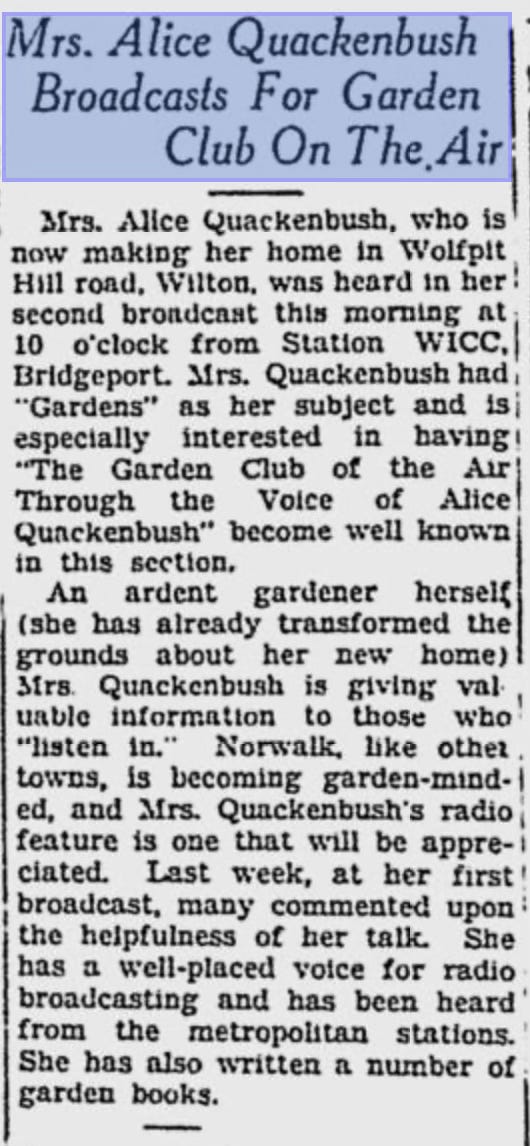Reading Alice T. A. Quackenbush’s books is like a visit to Flowerland, wherever that may be. She is the latest Lost Lady of Garden Writing, one who challenged my skills at finding accurate info. But the more I found, the more intrigued I became.
Biography
I struggled a bit to find information on Alice T. A. Quackenbush that I was sure was accurate via Ancestry.com and Newspapers.com. Believe it or not, there were several women named Alice Quackenbush who lived in the same time period.
For example, while searching in old newspapers on Newpapers.com, I found an item about an Alice Quackenbush who was fined $100 in 1898 for “keeping disorderly house” in Rochester, New York. I am confident she was not “our” Alice, the garden writer. Our Alice would not have had that last name at that time. Nor was she the Alice Quackenbush who represented Bedford, Indiana in a state beauty contest in 1930.
I believe our Alice was born around 1879 in Buffalo, New York to George and Alice Allen. I have notes indicating her mother died a week after she was born, but I can’t find my source for that tidbit so I’ll offer that information as “probably accurate, but needs verification.”
In the 1910 census, Alice is listed as a boarder in her husband Walter’s home. They were married on November 11, 1910. Walter was 12 years older than Alice. In the 1930 census, Alice is listed as living as a boarder in a home in Connecticut with the occupation of writer for garden magazines.
I found another newspaper article that confirmed that Walter was Alice’s second husband. Her first husband was John T. Ashbrooke, whom she divorced. The entire messy affair was written up as front page news in the Brooklyn Daily Eagle on March 8, 1909. One of the article's subheadings noted that her literary aspirations led to domestic trouble. He said she wanted a divorce so she could marry another man. She accused him of infidelity with other women. Front page news indeed!
Alice died on April 21, 1940, after being hit by a car in New York City. The driver of the car was determined by a judge to not be at fault and cleared of all charges, per some newspaper clippings about the accident.
Alice was a widow at the time of her death, and I don’t think she had any children.
I could not find any pictures of Alice, so we’ll have to use the introduction in All in a Garden Fair written by Helen Morgenthau Fox to imagine what she looked like:
The author of this charming book looks as if she had just stepped down from some Watteau or Boucher hanging on the wall. But along with the fragile daintiness in her appearance she has a scientific mind and a love for digging in the soil which no French court lady could claim.”
That tidbit sent me scurrying to look up paintings by those two artists to see what the women they painted looked like.
Her Books
Alice wrote many gardening-related articles including some published in The Garden Magazine and The Gardeners’ Chronicle.
She also wrote three books:
All in a Garden Fair (A. T. De La Mare Company, Inc, 1925)
The Annuals of Flowerland (The Macmillan Company, 1927)
Perennials of Flowerland (The Macmillan Company, 1929)
Reading through them, I found that Alice’s books are playful, insightful, and opinionated.
Consider this passage that Quackenbush wrote regarding scent in the garden in All in a Garden Fair.
“Some folks have a Puritan complex which inhibits the enjoyment of anything frankly sensuous; others consider a smell, even a sweet one, vulgar. Yet no one can quite banish such fragrances as those of spring, gentle and soft; of summer, hot and generous; or of fall, strong with the acrid overtone of burning leaves. Nor those of the earth after rain, a fresh plowed field, new cut grass, the seduction of dense woods. Smell is not merely the strongest of the senses and the most satisfying, it is health-giving in that it promotes deep breathing; let the utilitarian remember this, if he must have a reason. When he is blessed by the breath of the garden – that delightful mingling of Mignonette, Verbena, Stock, Wallflower, Honeysuckle, Pink, Lily and Rose – one hopes that he will forget himself for once and relax to happiness. If he cannot, he is surely of the damned.”
The word “gossipy” is used to describe Quackenbush’s other two books, The Annuals of Flowerland and Perennials of Flowerland.
"This little book of gardening gossip comprises odd bits of history, legend, and garden lore about each of the annuals commonly offered by the seedsmen.
And
“Mrs. Quackenbush,” says The New York Times, “writes in a pleasant, graceful, gossipy style, and made her modest book a real treasure house of garden lore.”
I own copies of all three of her books and would agree with one of the assessments written on the cover of Perennials of Flowerland.
“This is a volume to pick up at odd moments between gardening tasks, to read when planning next year’s garden, and to suggest new plants to order from the catalogs.”
One of the books I purchased was signed by Alice.
Her Radio Show
Alice also talked about gardening on the radio. In a 1926 newspaper, they showed the rundown of programs for various radio stations, and Alice was scheduled to talk about The Easter of Madonna Lily at 4:45 pm on WEAF. Later, in 1931, she was living in Connecticut and had just started a radio program, “The Garden Club of the Air Through the Voice of Alice Quackenbush.”
I don’t know how long her radio program lasted.
Alice is Still A Mystery in Many Ways
Every time I think I’ve found out all I can about Alice T. A. Quackenbush, I find something new when I do a search through Newspapers.com, or I get a bit confused by Ancestry.com. So some aspects of her life, especially her childhood and where she went to school, will remain a mystery for now.
With that, I will leave you with another quote, this time from the introduction Alice wrote for Perennials in Flowerland…
“The royal road to happiness passes through the garden, in fact, may begin and end there. For to garden successfully is achievement of the finest. Its sturdy requirement can lure youth from less admirable pursuit; its benign serenity makes point to age that usefulness increases with the passing years. Call it tonic, sport, science, art, if you will. But do not fail to call it, adventure.”
You’ll get no argument from me. Gardening is an adventure, and so is reading old gardening books.
As I wrote in a blog post about Alice in 2012: Old gardening books have the power to transport us back to another time. They can remind us of plants long forgotten and help us see old plants in new ways. The authors can be sweet and sugary or pompous and pontificating. They can lead us in directions we never imagined and take us along on adventures we never anticipated.
Do you know about a Lost Lady of Garden Writing that I might find of interest? If so, send me an email or leave a comment to let me know.
And if you find these articles of interest and think others would too, please share them and/or subscribe.
I’ll return with the next Lost Lady of Garden Writing article in two weeks. In the meantime, you can find me in several places: my website and blog, The Gardenangelists podcast, and my new weekly newsletter, In the Garden With Carol.








WOW this is quite the delightful story. Alice seems like quite the spicy writer and garden goddess for her time!!!